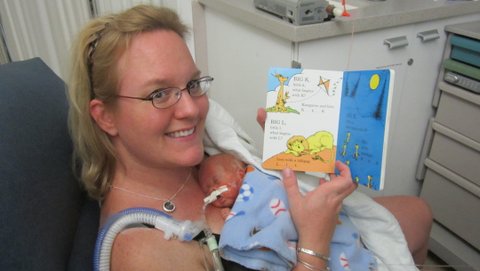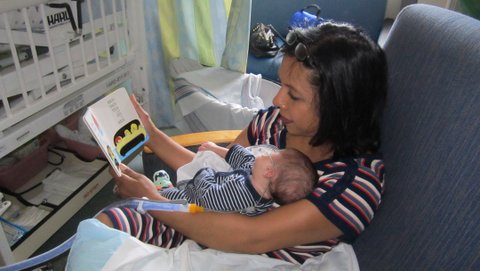NICU Reading Program Encourages Language Development Amongst Tiniest Patients

Language exposure often begins when a child is still in mommy’s belly, making it critical for a baby who is born early to make up for lost time soaking in voices from the inside. In hopes of improving premature infants’ language and school readiness skills, the staff at UR Medicine’s Golisano Children’s Hospital have incorporated a special reading program into their patient and family care plan in the Neonatal Intensive Care Unit (NICU). Created with the evidence-based nonprofit organization “Reach Out and Read” in mind, the NICU reading program encourages parent-child reading by giving families a stack of developmentally appropriate books from the moment of discharge from the hospital to when the child has reached 5 years of age.
 Started in 2007 by former neonatology fellow Margaret Bulonowski, M.D., the NICU reading program has served more than 1,320 families and is now funded by a gift account made possible by the generosity of former NICU families.
Started in 2007 by former neonatology fellow Margaret Bulonowski, M.D., the NICU reading program has served more than 1,320 families and is now funded by a gift account made possible by the generosity of former NICU families.
“Our NICU families and grads love to give back to the unit and the reading program is a wonderful result of that kindness,” said Chief of Neonatology William Maniscalco, M.D. “The Reach Out and Read Program gives parents a way to become intimately involved with their new baby and to bond with them while positively impacting their reading and verbal skills.”
Parents of babies born prematurely, with a gestational age under 30 weeks, are sent a total of 10 books. Stories are chosen by neonatology information analyst Diane Prinzing from “All About Books,” a vendor based in Canandaigua, and range from those with large pictures of shapes and faces, which are great visual stimulation for newborns, to board books at 9 months, to “I Can Read” level books at 60 months.
Janelle Reed and her husband Brian were thrilled to be a part of the Reach Out and Read Program. The Reed family had already established an at-home library for their newborn twin girls Kendall and Sidney, who were born at just 25 weeks, with Kendall weighing 1 lb and 14 oz and Sidney weighing in at 2 lbs. “We had always been a book-reading family, but having the additional books that were set at developmental stages was fantastic,” said Janelle Reed, Kendall and Sidney’s mother. “The girls recently turned 7 and, although we still read to them and they read to us, they look forward to reading on their own at bedtime. We have no doubt that their love for reading has expanded their vocabulary. We intentionally use an extended vocabulary with them and when they see or hear an unfamiliar word they always ask what it means,” said Janelle.
 “The reading program is a formalized way of getting parents to read more to their children,” said neonatal researcher and Professor of Pediatrics Carl D’Angio, M.D. “The regular delivery of books, with an anticipated increased reading frequency and guidance from pediatricians, positively impacts language acquisition among children over time.”
“The reading program is a formalized way of getting parents to read more to their children,” said neonatal researcher and Professor of Pediatrics Carl D’Angio, M.D. “The regular delivery of books, with an anticipated increased reading frequency and guidance from pediatricians, positively impacts language acquisition among children over time.”
According to a study published in Pediatrics in 2011 on the importance of parents talking to their babies and its influence on vocal development in children born preterm, the more adult language the infant was exposed to, starting in the NICU, the greater the number of vocal responses, such as coos and laughs. This was also true with overall turns in conversation, with the infant making a sound followed by a parent’s response and vice-versa.
“As a developmentally supportive intervention and a vehicle to help parents and siblings bond with the new baby in the NICU, I have always advocated for families to read to the baby,” said Chris Tryon, NICU child life specialist. “We have a book shelf outside of our A1 pod and I always invite families to bring books in from home.”
To build upon its existing reading program, the NICU recently implemented two new reading initiatives, encouraging even more families to get involved. NICU babies not previously eligible for the reading program will now receive an infant board book called “Little Faces” when they are discharged home or to another hospital. In addition, thanks to Project: Cameron’s Story, a program that was started by a Glens Falls mother who used reading to bond with her micro-preemie, every baby admitted to the NICU will receive a book within their first week of admission. Books are provided, free of charge, by Cameron’s Story with a paper insert explaining how the book got to them. Many of them are donated by children at birthday parties, fundraisers, etc.
Each of these influential book programs will be carried over to the new and greatly expanded Neonatal Intensive Care Unit when the eight-floor Golisano Children’s Hospital opens its doors in the summer of 2015. The private nature of the single-patient rooms will allow parents to spend more intimate time talking to their newborns and reading aloud to them.
“We are hoping that the private patient rooms in the new hospital’s NICU will allow for the proper kind of stimulation for the babies,” said Maniscalco. “Rather than hearing the array of sounds that they do in the current NICU, babies using the new rooms will be able to focus on their family’s voices, allowing for exceptional bonding time.”
To donate to the NICU Reading Program, visit our giving page. You can also mail donations to the Office of Gift and Donor Records, with attention to the NICU Reading Program, at 300 E. River Road, PO Box 270032.